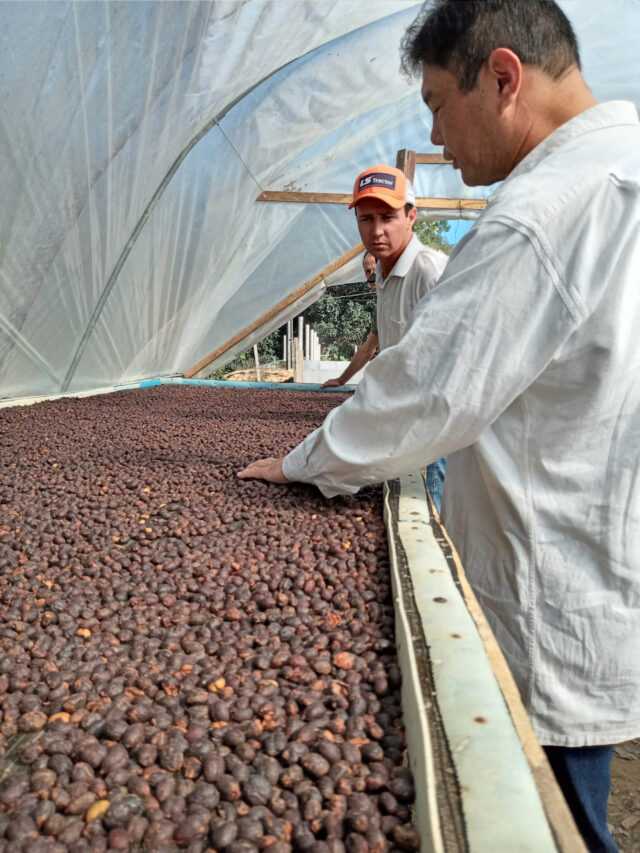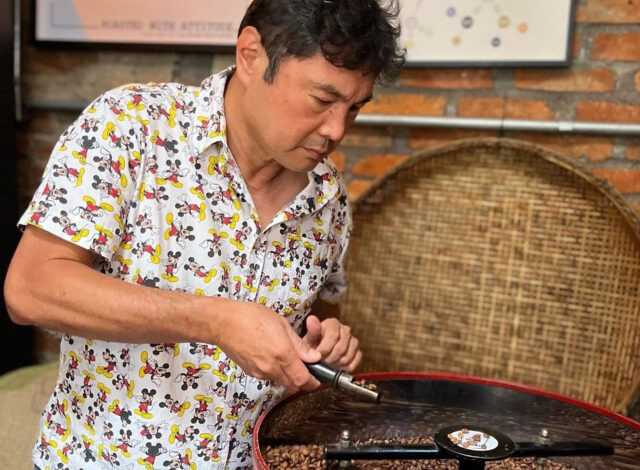MILAN – Ensei Neto is a Chemical Engineer from Escola Politécnica da USP, has a specialization in Food Technology and Marketing and is an expert consultant in Marketing and Quality of Specialty Coffees by the Specialty Coffee Bureau. He worked in food industries for 9 years and was a coffee grower for over 12 years, which allowed him to know everything from seedling preparation to the international coffee trade. He was a member of the former Technical Standards Committee of SCAA – Specialty Coffee Association of America, and also served on the Laboratory Certification Committee.
He’s also the creator of “The Coffee Traveler“, a website that has existed since 2006. A space to share Knowledge and Sensorial Experiences among coffeelovers all over the world. We spoke to him, to know better what is his vision and passion about the universe around the beverage.
Neto, what exactly is The Coffee Traveler? A coffee website started by a chemical engineer: can you tell us about it? How it came about, especially since it was 2006, he was a bit of a pioneer on the web
“The Coffee Traveler started as chronicles of my travels around the world thanks to coffee. They are also my reflections on production and evaluation processes and the people who gravitate to the caffeine universe. Due to teaching courses (I served as a member of the Technical Standards Committee o the former SCAA, for example), my experience in the food and beverage industries, in addition to having experience as a producer, I started to comment on coffee curiosities in simple language. And I had no idea that it was the first specialized blog about coffee.”

What does a marketing and quality consultant do for the Specialty Coffee Bureau? And what is the Specialty Coffee Bureau?
“This is my consulting firm with expertise in Sensory Management, creating new products or improving production processes. Among the clients we have international companies such as Nestlé Brasil and Uruguay, Melitta South America with coffee products and processes; in the area of cocoa and chocolate, our expertise is in the “bean to bar” segment with clients such as Dengo, one of the most important in Brazil, and Harald.
We also offer services for spirits and beers, with clients in Brazil, Argentina and Mexico, in addition to wines and mineral waters.”
Neto, you seem to be a technical professional in every aspect of the bean: you deal with raw material evaluation, sensory, roasting and marketing: how did you become an all-round expert?
“I have a degree in Chemical Engineering with a specialization in Food Technology.
I worked for 9 years in companies from different sectors such as cachaça, wine, sake and production of amino acids, as well as spices and sugars, always in innovation and new markets. Dealing with new products requires a good preparation in sensory analysis.
In 1987 I left São Paulo and we moved to my father-in-law’s coffee farm, when I started my relationship with this new world. I lived as a producer until 1999, when the property was sold.

That’s when I returned to the consulting activity and actively participating in entities such as the former SCAA. I also decided to resume education activities such as courses and lectures.”
So you have also been a farmer for over 12 years: what would you like to share and what has this experience left you?
“As I mentioned, living on the farm gave me intimacy with plants and nature. I learned the relationship that light imposes for trees to develop properly and, even because I had no prior knowledge, I started movements and activities that are common today, such as the integration of crops with native vegetation, the use of natural products to control of pests and diseases, and using tools such as agrometeology and statistical analysis.”
What is your current job? Do you work with any specific companies, as well as spreading the word about the culture of coffee?
“In addition to courses and training, I maintain several projects in progress as a consultant, such as the creation of production models for Coffea canephora in Brazil at the request of Nestlé Agrícola, and an innovative program of assisted pollination with bees, which has shown surprising results. In other areas, I am leading a project for structuring protocols for the sensory evaluation of Yerba Mate (Ilex paraguariensis), for example.”
What does coffee mean to you?
“A very important part of my life, along with music and gastronomy. As a child, I drank coffee with milk typical of Brazil known as “media” (something like 50%/50%), half coffee and half milk. But it wasn’t the drink that I loved. When I was working on my father-in-law’s coffee farm, a neighbor came to me for help, as he knew he was an expert in brewing. They built a huge fully washed coffee plant and were struggling in the process. I was unaware of the process until that moment and asked for some analysis to make sure what should be done.
I made the adjustments with a few ingredients and everything went very well. A few months later he brought the roasted coffee in a nice tin from Japan and gave it to me. He said it was the batch whose process I had adjusted and that was highly praised by Japanese roasters. It was the first time I tasted a fully washed coffee and I was simply in love!
My favorite extraction is filtered (Melitta, Hario, Kalita or any other). Sometimes I prepare coffee in differents ways like french press, aeropress or Pressca (this is a Brazilian system).
Usually I drink something like two or three 400ml jars of coffee every day.
Neto, and if I say “espresso”, what comes to mind?
“Strength and complexity. I really like to drink espresso too, but I don’t have any equipment at home. These are very intense drinks, so the grain selection has to be the best possible. If it becomes an immaterial patrimonio of UNESCO, it will be a reference of process, service and experience. Particularly, I drank excellent espressos in northern Italy and also in Rome. It’s a very well done service.
I’ve always had the perception that espresso is the synthesis of Italian culture because it asks the barista to know his machine well, the coffee bean that will be used and the entire process, especially in the double grinding and compaction.
All this right, the show is guaranteed, as the espresso service was one of the first to have very expressive choreography and gestures.”
How do you comment on the current situation of shortages of raw materials, rising prices and container difficulties?
“This situation always occurs when a major impact event like the 2021 frost in Brazil. The effects are felt in the following years with greater intensity. On the other hand, this time there is a new and powerful component, which is the pandemic, which has brought disorganization in maritime logistics, in the production of inputs and even packaging.
We observed that for part of the world population, one of the consequences was the loss of income, making it difficult, on the one hand, to maintain some businesses, but stimulating others due to greater consumption at home.
Particularly, despite all the difficulties that the world is going through, coffee has been a safe haven for people, increasingly as affection and indulgence for moments of introspection, and stimulus and brightness for vibrating activities.”
Neto, can you estimate when the situation will return to normal?
“The world changed.”
Will specialty be a trend that will expand beyond the usual niche in your opinion?
“This year the specialty coffee market turns 40, an age when people usually take a first big balance of life, as it is the balance point between vitality, experience and creative capacity. And, also, you have leftover money. Some practices that can be observed are exactly the same as in the mainstream market, the same deviations and impositions made by large corporations.
If it is no longer a niche market, it opens up opportunities for ruptures. History is like a fractal, its development is nothing more than repeating itself indefinitely, with some new shapes or colors, but basically repetitions. So the break will likely be back to basics. The pandemic is teaching us this.”
What does the industry and the market expect in the coming years?
“We are living the 4th Wave of Coffee. The waves are the way coffee is consumed, which left the traditional Cafés, went to places where the barista gained prominence, starting with the classic espresso service in Italy, giving transparency to the grain trade by presenting origins and producers and showing the consumer different preparation methods.
Now is the time when every home can be a coffee shop or a roasting plant. The pandemic simply accelerated the process. The amount of new products and methods made residential consumption take an Olympic leap, creating a legion of more demanding and discerning consumers at the time of purchase.
As a result, interest in courses and workshops has increased exponentially, which should be reflected in a vigorous market with greater quality criteria. The result? It should remain strong and complex like an espresso.“


















